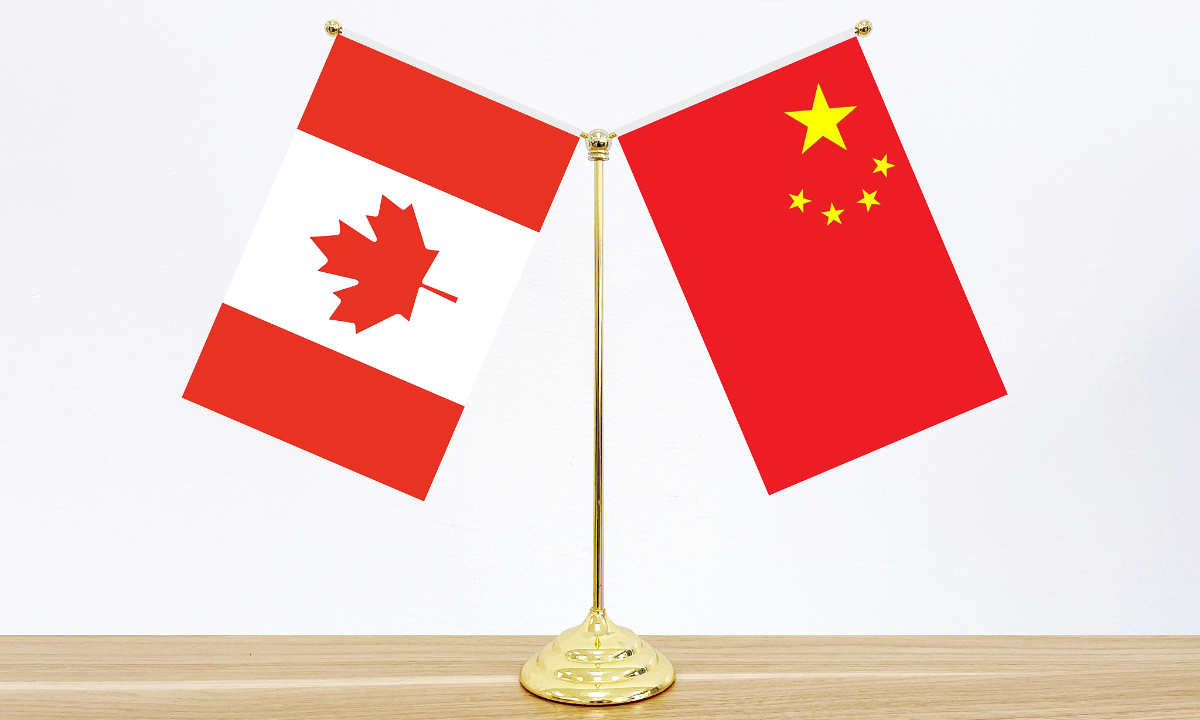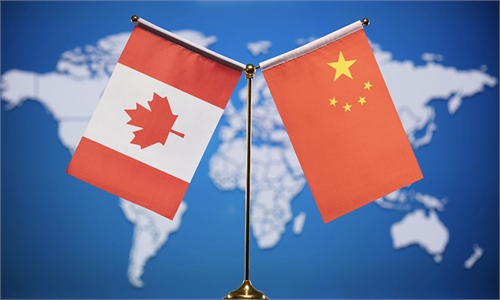Be wary of hawkish rhetoric in Canada to hinder ties with China despite positive signs

China Canada Photo: VCG
On Saturday, Melanie Joly concluded a three-day trip to China, the first visit by a Canadian foreign minister since 2017. While this is a positive signal for the easing of China-Canada relations, the constant hype over recent years by some Canadian politicians about the "China threat" may continue to create obstacles to bilateral relations, which should still be of concern.
Joly's surprise visit to China is widely seen as an icebreaker. China-Canada relations had long been at the forefront of China's relations with the West, but relations between the two countries have taken a sharp decline since the incident involving Huawei's Meng Wanzhou in late 2018. The Canadian foreign minister's China trip proved that despite the differences between the two countries on topics including human rights, national security and the Russia-Ukraine conflict, Beijing and Ottawa still retain the will to improve bilateral relations and bridge differences through enhanced communication.
Yet, on the same day that Joly kicked off her China visit, Canada's new Chief of the Defence Staff, Jennie Carignan, said that Canada has five years to "prepare for new threats from adversaries such as China and Russia," while directly calling China a "conventional opponent."
This is the latest typical example of Canadian politicians' accusations or attacks on China with heightened hostility, which have become commonplace in Canadian politics over the past few years. A number of Canadian politicians hold no independent foreign policy positions of their own, and what they squawk over and over again is the rhetoric of China hawks in the US. When the US gets tough on China, those politicians argue that Canada should do the same, disregarding the real needs and interests of their country to gain attention and hopefully, some votes.
The US and Canada are longtime allies, so Washington's hawkish stance on China policy influences Canada's position. But in fact, the US has also been exerting political pressure on Canada to be consistent with it in dealing with China. The US plays a guiding, influencing and coordinating role in Canada's China policy, directly or indirectly influencing Canada's stance and actions toward China through a variety of diplomatic, economic, security and political means.
Lü Xiang, a research fellow from the Chinese Academy of Social Sciences, told the Global Times that the US has constantly put pressure on Ottawa in the hope of tying it tightly to Washington's anti-China coterie. Yet, standing against China, its second-largest trading partner and a major power, doesn't really help Canada.
Lü also argues that like many US allies, Canada is now entering a "period of confusion." This is because the final outcome of the US presidential election in November will have a direct bearing on how the country views its alliances. Therefore, as the election enters a very critical phase, Canada now should be extremely apprehensive about what kind of foreign policy the next US president will put in place.
In fact, such a "period of confusion" about the US could also provide a window for Canadian politicians to reflect on their stance toward China. All along, Canada's hawkish moves of "dancing to US tune" regarding China have had many negative impacts on the relationship between Beijing and Ottawa, weakening cooperation and mutual trust between the two sides across a number of key areas.
During a meeting with Joly on Friday, Chinese Foreign Minister Wang Yi emphasized that there is no conflict of fundamental interests between China and Canada, and people in the two countries have long practiced friendly exchange. Ottawa's reflection on how to gradually get rid of its excessive dependence on Washington's policies and truly carry out independent diplomatic activities with Beijing based on its own national interests to realize mutually beneficial and win-win cooperation will be conducive to the long-term, healthy development of China-Canada relations.
Dealing with historical issues and current political differences will determine the future direction of China-Canada relations. Despite some recent positive signals, some deep-rooted issues in the bilateral relationship remain unresolved, and these issues may take longer and more diplomatic efforts to resolve. To keep the channels of dialogue open, both sides need more than just words of willingness; they need tangible moves based on rational thinking and independence.
Ottawa, in particular, must not allow itself to be swayed by the Cold War mentality of some politicians at home and fall into the trap of an unwarranted bloc confrontation. Nor should it continue to allow Washington to hijack Canadian foreign policy. Otherwise, it will miss the opportunity to improve the China-Canada bilateral relations that Joly's visit to China started and let the bilateral relations continue to go astray.

